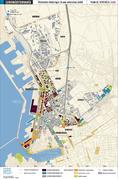history premi tesi di dottorato resilience downtowns urban theory citizenship networks urban form conservation & preservation call for articles call for papers creativity competition digitalization sprawl local development industrial sites populations inclusive processes central places educational globalization social capital simulation technology
A window on: Marseille
Heidi Bergsli
Visualizza la mappa di A window on....
Competitive strategies using the urban landscape to promote economic growth have become common in European cities to counteract economic decline, stagnation or unemployment. But the effects of these policies are quite severe in their social and cultural outcomes.
First, they often represent anti-social policies which symbolically, culturally or materially produce social inequalities geographically into an inner-city of wealth and an outer city of poverty and neglect.
Area-based strategies tend to lose sight of the greater picture, the horizon of all citizens. Cities or metropolitan regions may further not necessarily manage to sustain several commercial or consumption nodes, leading to a zero sum game within the territory, quite opposite the intentions of a strong metropolitan region to meet global territorial competition.
There are also no certainties that the current landscapes developed will retain mobile capital. Instead, we witness a range of cities becoming increasingly similar because of general fashion in urban design and consumption. Perhaps the concern with sublime banality, which would signal quality and substantial offers on a lower scale, catering the inhabitants of the city, would be a more sustainable strategy.
IN DOWNLOAD:
(ENG) Le sublimi Banalita' di Euroméditerranée, by Heidi Bergsli
(ITA) Euroméditerranée: in corsa per la modernità, by Heidi Bergsli
Related articles:




Planum
The Journal of Urbanism
ISSN 1723-0993
owned by
Istituto Nazionale di Urbanistica
published by
Planum Association
ISSN 1723-0993 | Registered at Court of Rome 4/12/2001, num. 514/2001
Web site realized by ChannelWeb & Planum Association | Powered by BEdita 3



